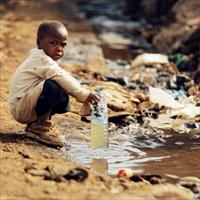Malawi Receives US$25 Million Additional Financing For Water and Sanitation

The Government of Malawi and the International Development Association (IDA) today signed a US$25 million grant to improve water supply and sanitation services in towns, market centres and rural areas of Malawi. The funding builds on an already operational US$50 million Second National Water Development Project (NWDP II) financed by IDA that commenced in 2007.
The new funding is from the Africa Catalytic Growth Fund (ACGF), which is a multi-donor trust fund that seeks to scale up funding for promising interventions in Africa. The fund focuses on countries that have an opportunity to make significant progress in showing improved development results toward growth and hard to reach Millennium Development Goals (MDGs). The ACGF is administered by IDA.
The funding agreement was signed by the World Bank’s Country Manager for Malawi Mr. Timothy Gilboand Malawi’s Minister of Finance, Honourable Goodall Gondwe.
“This new funding from the Africa Catalytic Growth Fund will be instrumental in helping Malawi meet the important MDG target of water and sanitation. That the Catalytic Fund has chosen to support Malawi demonstrates that progress is being made in implementing the Malawi Growth and Development Strategy,” said Mr. Gilbo.
In Malawi, the ACGF financing is focusing on MDG 7 – Ensuring Environmental Sustainability with the specific target of halving, by 2015, the proportion of people without sustainable access to safe drinking water and sanitation.
The new project will expand water supply and sanitation services to the towns of Chitipa, Chilumba, Rumphi, Nkhata Bay, Chintheche, and Ekwendeni. The towns that are already targeted under NWDPII are Mzuzu, Zomba, Kasungu, Mzimba, Mangochi, Mponela, and Likuni.
The new project will also strengthen the operational efficiency of the Southern, Central and Northern Regional Water Boards in the planning and delivery of water supply and sanitation services to the following towns, market centres and rural areas: Bunda, Natural Resources College, Chitedze, Dedza, Ntcheu, Salima, Likuni, Senga Bay, Chipoka, Ntchisi, Dowa, Madisi, Mchinji-Kochilira, Dwangwa, Mitundu, Linthipe, Liwonde, Balaka, Ngabu, Lirangwe, Songwe, Misewu Folo – Chikwawa, and Likoma and Chizumulu Islands.
It is expected that at the end of the project, 500,000 people will have new or improved water supply and 250,000 will have improved sanitation. There will be about 3,700 new water connections in rural areas and 4,040 rehabilitated connections. About 1,700 new community water points will be installed while 2,700 will be rehabilitated. One hundred and forty schools will have access to adequate sanitation facilities. In towns and market centres 2,500 new connections are planned, while 5,000 connections will be rehabilitated.
Both the ACGF and NWPDII are contributing to a five year (2007-2012) national water development program developed by the Malawi Government whose estimated investment requirement is about US$300 million. The other financing institutions for the water plan include UNICEF, CIDA, EU/EIB, AfDB, JICA, OPEC Fund, UNDP, and Water Aid.
 Back and Next - Back and Next
Back and Next - Back and Next See Also - See Also
See Also - See Also